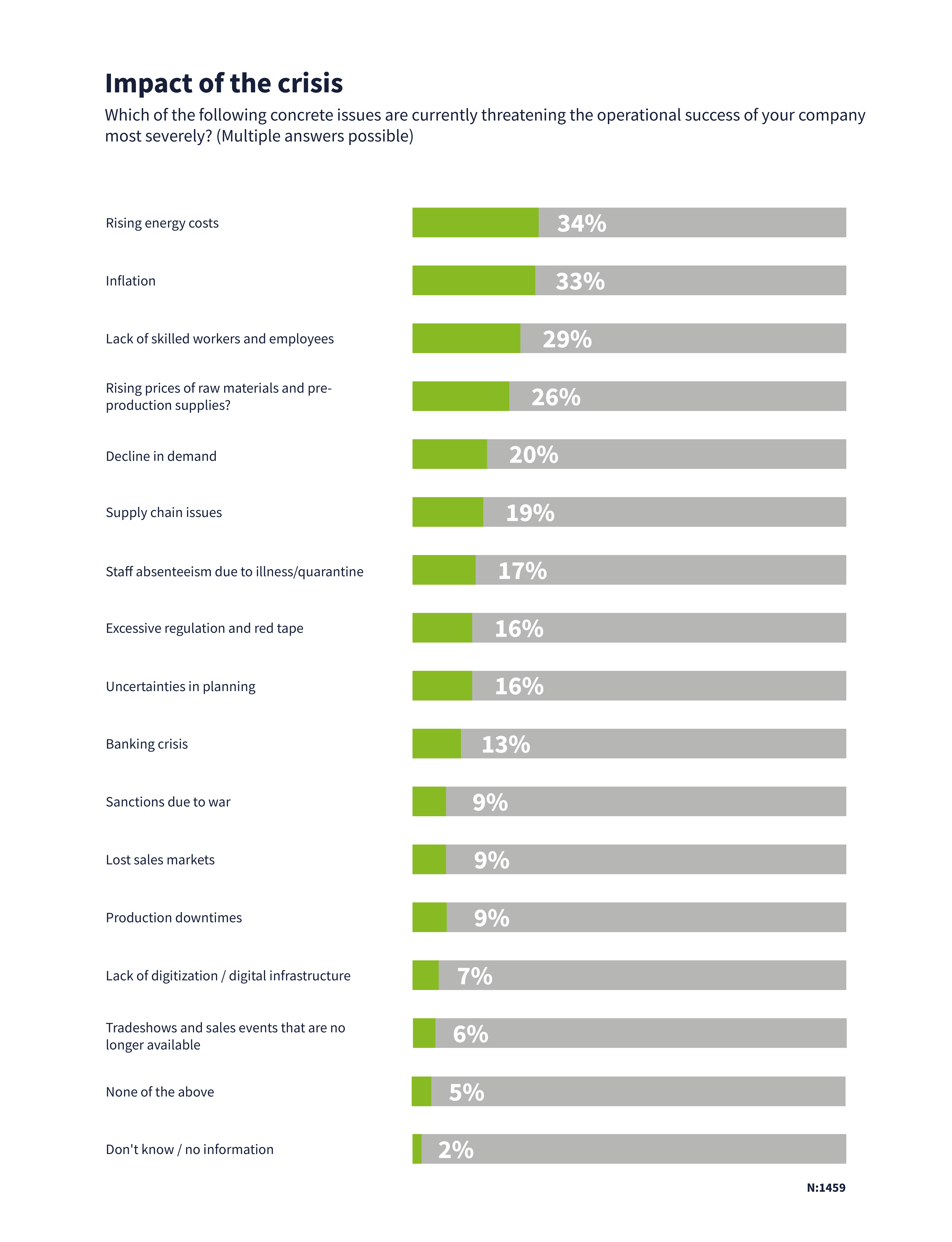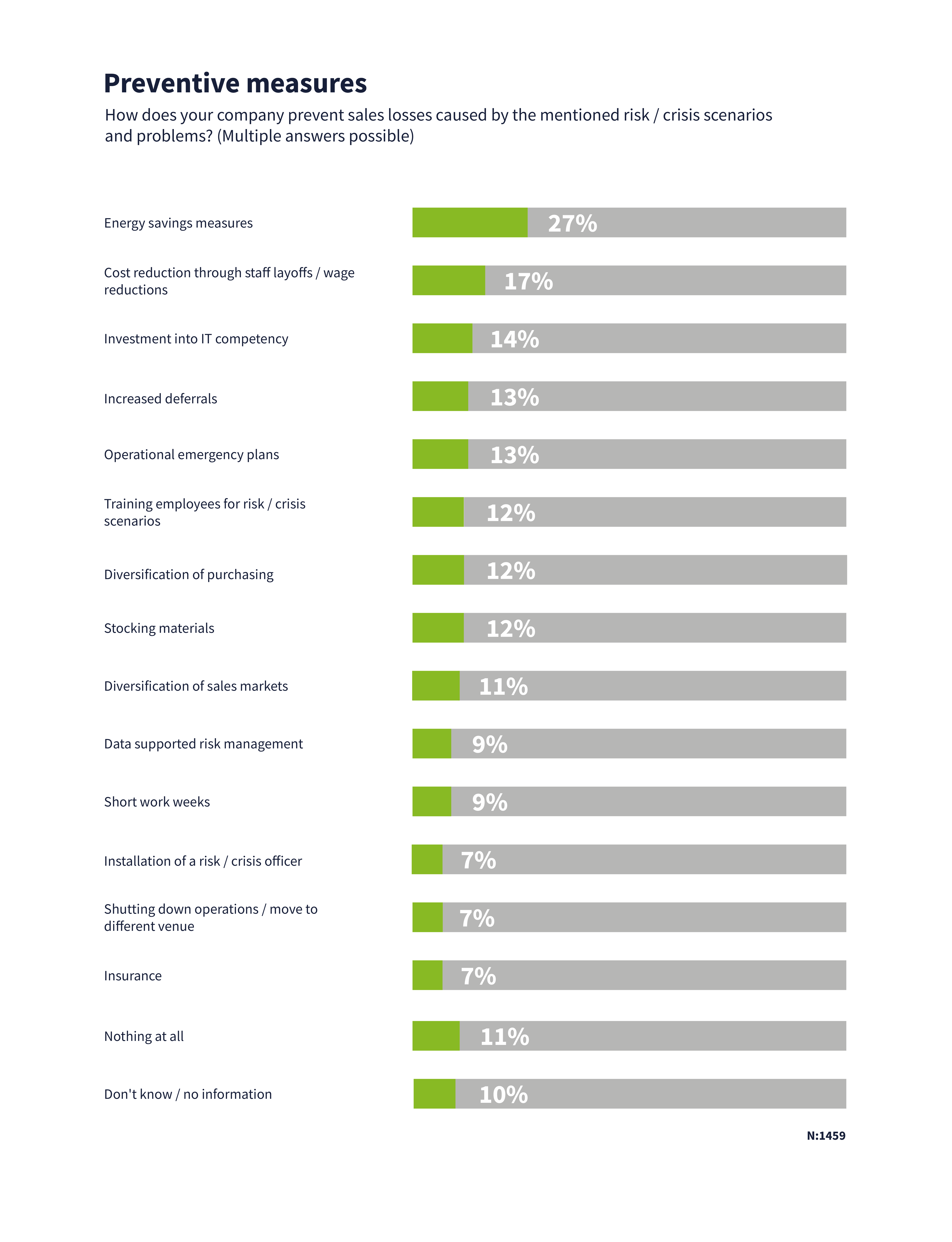· Companies remain in crisis mode
· Hope: Over 10 percent of SMEs report increased turnover
Hamburg/Paris, 10 May 2023 - In 2023, the economic crisis further is depressing the mood of small and medium-sized enterprises. This means that it is now the strongest threat among the overlapping crises, having been on a par with fear of war at a lower level in 2022. Fear of war is still at a high level, but is dropping significantly and now shares space with cyberattacks as the second-strongest threat. This is the result of a survey conducted by the opinion research institute YouGov on behalf of the B2B platform operator Visable. The expectation for the future also remains negative. More decision-makers in SMEs expect crises to become much more frequent. But there is also a ray of hope: Significantly fewer SMEs are reporting a drop in turnover, and more than 10 percent of the SMEs are even recording an increase.
Approx. 30 percent of those surveyed see the economic crisis as a threat to their company's business activities. A triad of rising energy costs (34 percent), inflation (33 percent) and a shortage of skilled workers (29 percent) is currently the greatest burden on French, German, Austrian and Swiss companies. For the second time in a row, energy costs are the number one problem area. The burden of inflation as well as skill and labour shortages is clearly growing year-on-year, while rising commodity prices and supply chain problems are putting much less pressure on the economy than they did a year ago.

With energy savings through the crisis
The aforementioned crisis scenarios continue to have a concrete impact on business figures. More than 50 percent of the companies are affected by turnover losses. Nevertheless, last year it was still more than 10 percent of the decision-makers surveyed now state that their company's turnover has even increased since the beginning of 2022. Are these signs of increased resilience? Probably yes, because more and more SMEs are taking precautionary measures. Saving energy is the motto here. Right off the bat, corresponding efforts lead the broad catalogue of measures with 31 percent. Sandra Yönter, Vice President Marketing & Managing Director Visable International says, she is cautiously optimistic in view of the many initiatives: "The situation remains serious, but small and medium-sized enterprises are actively accepting and rising to the enormous challenges. In order to continue to persevere and come out of the crisis stronger, they need improved framework conditions. This is where politics is needed.

Energy, bureaucracy, digitalisation: new and familiar SME demands on politicians
When it comes to energy, the shoe pinches. Not only because of the costs, but also the uncertainty about future supply is great. Although the horror scenario of a winter without gas and electricity has been averted, the demand for better security of energy supply is sandwiched between the two business "classics" of reducing bureaucracy and tax cuts. In this context, the sharp drop in the desire for greater European cooperation is striking. It was only at the end of last year that the EU states settled their dispute over the bone of contention, the gas price cap, and since 15 February the so-called market correction mechanism has been in force. Did the decision come too late and is the mechanism proving to be toothless? In any case, trust has been gambled away: The demand for stronger cooperation at the European level drops. On the other hand, the need for a better digital infrastructure remains high. The importance of the demand for tougher measures against climate change and investment in environmental protection has dropped noticeably. It now only ranks fifth on the list of desired political measures.
International comparison: France is out of the ordinary
High inflation and rising energy costs are also a concern. Parallel surveys conducted by YouGov show that these two problem areas pose the greatest threat to business success in France, Austria and Switzerland and are most frequently countered with energy-saving measures. Whereas in Germany (35 per cent) and Austria (38 per cent) concerns about a shortage of skilled workers and labour have risen sharply, they have fallen noticeably in Switzerland and France. Due to its family policy, France is delayed in entering the troubled waters of demographic change. The violent protests against a higher retirement age are evidence of the acute domestic political upheavals. Among the three EU countries in the survey, France also stands out in other respects. Energy costs and inflation are significantly less of a burden on companies there than in Germany and Austria. A gas price that has been frozen since autumn 2021 and an electricity price that was capped early on, as well as a fuel rebate, cost the French state a lot of money, but kept inflation lower and had an impact on the success of companies: 15 percent of the French companies surveyed were able to increase their sales last year despite the crises, more than in any of the other countries including Switzerland. Nevertheless, French decision-makers are still the most likely to express pessimistic expectations of the crisis, at 73 per cent. By contrast, Swiss entrepreneurs are now much more optimistic about the future: only 66 per cent expect crises to occur more frequently, compared to 71 per cent last year.
The online surveys were conducted from 28 March to 3 April 2023 by the market research institute YouGov. In Germany, 500 people with decision-making authority in small and medium-sized enterprises took part, in France 526, in Austria 217 and in Switzerland 216 people were surveyed.
We will be happy to provide the complete results of the survey on request.
About Visable
Visable supports industrial SMEs in making products and services internationally accessible to buyers. As a combination of its own B2B platforms and online marketing services, such as Google Ads and retargeting, tailored specifically to business customers, the company offers a broad digital portfolio for increasing reach on the internet.
The platforms operated by Visable GmbH include wlw ("Wer liefert was"), today the leading B2B platform in the D-A-CH region, and the European B2B platform europages, on which around 3 million companies are registered. Together, the platforms reach over 3 million B2B buyers a month who are looking for detailed company and product information. With its online marketing services, Visable offers companies additional opportunities to increase their reach on the Internet. Visable was created in response to the challenges of internationalisation and digitalisation in the B2B sector and today employs around 480 people at its locations in Hamburg, Berlin, Münster and Paris. As a joint umbrella for the wlw and europages brands, Visable is continuously expanding its B2B platforms and online marketing services.
You can download the graphics here and here.
